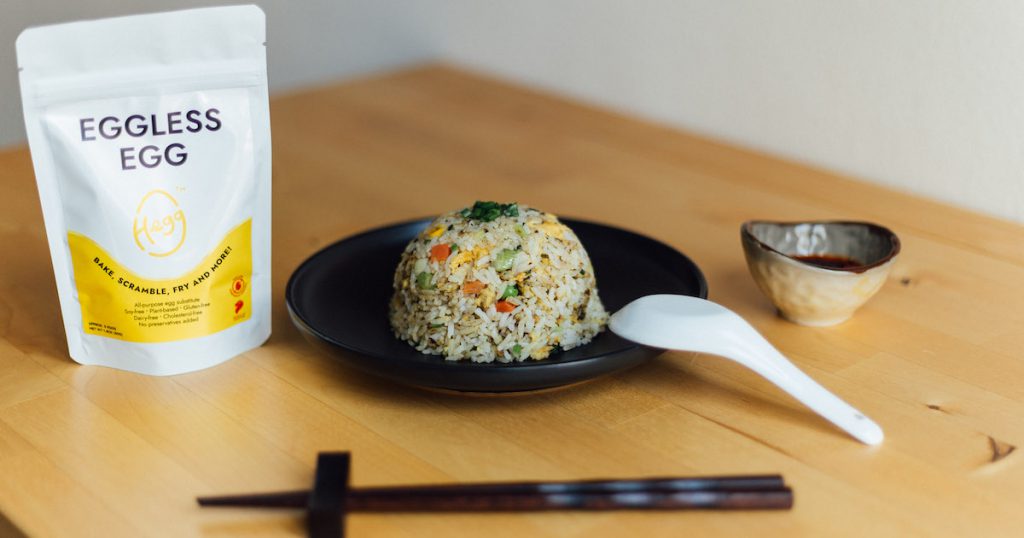Homegrown food tech company Hoow Foods announced last week (August 3) that it has launched a plant-based subsidiary called Hegg Foods following a recent S$3 million fundraising in a pre-Series A round led by Singapore-based venture firm Farquhar VC.
According to the company, Hegg Foods focuses on developing novel sustainable food products that address growing consumer demands for healthier plant-based alternatives that are environmentally-friendly.
In line with this vision, Hegg Foods will be launching a new healthy plant-based egg brand called HEGG, which marks its first foray into the consumer market.
Entering the alternative protein space
The panic buying bout during the nation’s lockdown last year prompted the government to step up and assure Singaporeans that the country was not at risk of running out of essential food supplies.
However, the COVID-19 pandemic still brought to light the issue of Singapore’s food security. In response, the Singapore Food Agency (SFA) has set out a target to produce 30 per cent of the nation’s food by 2030, also known as the “30 by 30” goal.

Hegg Foods’ CEO Ow Yau Png explains that Hegg Foods is particularly “keen to address the problem of ensuring food supply resilience for one of the most affordable and widely available sources of protein (hen eggs).”
He added that Singaporeans consume over five million eggs daily, but local production can only meet less than 27 per cent of the demands.
Hegg Foods plans to feed the growing local and regional population in a healthy yet sustainable manner by tapping into the alternative protein space.
As a new plant-based egg alternative, it would allow Singapore to diversify its supply and availability of common and affordable protein sources.
Hen-shelled eggs, on the other hand, while cheap and readily available, comes with various health and environmental implications.
According to Yau Png, 20 per cent of fresh food in Singapore are damaged or spoiled before they even reach and a lot of food is discarded due to food safety concerns.
Therefore, plant-based food alternatives like HEGG can help to improve air quality and animal health and welfare due to the reduction of intensified livestock farming.
You can buy their plant-based eggs as soon as 2022
To produce plant-based eggs, Hegg Foods leverages on Hoow Foods’ proprietary Food & Ingredient Artificial Intelligence (AI) platform, RE-GENESYS, which harnesses ingredient informatics to develop food products.
Manufactured in Singapore, HEGG is made up of a combination of plant-based legumes and ingredients.
Nutritionally, one serving of HEGG has a protein content almost identical to that of a regular-sized chicken egg. However, this plant-based egg alternative not only contains significantly less fat, it is also free of cholesterol, dairy, gluten and soy, with no added preservatives.
Blended in powdered form, HEGG prioritises convenience and a long shelf-life.
Hegg Foods has factored in various useful features to simplify production and logistics. For instance, HEGG in its powdered form allows manufacturing to scale easily. Shipping the product is also easier because HEGG does not require refrigeration and has a relatively longer shelf-life.

Not only is HEGG versatile across various culinary applications, it is also very shelf-stable in its powdered form. These factors set HEGG apart from other plant-based egg products available in the market, including Float Foods’ OnlyEg, OsomeFood’s plant-based hard boiled egg, and Eat Just’s Just Egg.
The company’s R&D team is constantly finding novel ways to improve the versatility of HEGG, which can be used in western-style cuisines such as scrambled eggs and omelettes. Furthermore, its easy application in Asian-style cuisines can enable HEGG to be widely adopted throughout Asia.
Hegg Foods is currently planning its pilot scale production and is working on commercialising HEGG.
For starters, it intends to work with select F&B partners and caterers to introduce HEGG into their curated menus. The company also hopes that by next year, HEGG will be “B2C-ready” and be stocked on the shelves of supermarkets and e-commerce sites.
What will it take for consumers to switch to plant-based eggs?
With strong aspirations to scale up and set up a full-scale facility in Singapore within the next two years, HEGG is well on its way to reduce the nation’s reliance on egg imports by 20 per cent within the next five years.
Plant-based diets are gaining traction globally, with the issues like climate change and taking the spotlight. Moreover, amidst global reports that food allergies, including egg allergies are on the rise, plant-based eggs could actually be more commonplace in the near future.
And in multi-religious, multicultural Singapore, plant-based eggs might have a strong foothold in some communities due to dietary restrictions in some religions. For instance, some religions like Jain and Buddhism don’t eat eggs.
To keep HEGG widely accessible, consumers must find it economically reasonable to make the switch. If plant-based eggs are priced comparably to chicken eggs, they would be more incentivised to make the switch for more altruistic reasons, be it ethical or environmental.
Yau Png said that with their experience with other F&B products such as Killiney-branded coffee and tea and Callery ice cream, and eventual economies of scale, he is confident that they would eventually be able to “price HEGG competitively to hen eggs.”
For now, plant-based eggs are not easily available in local supermarkets, apart from vegan egg substitutes for baking. With this gap, it is likely that plant-based eggs would take off in Singapore, in the same way that plant-based meats like Beyond, Impossible, and Quorn have.
Startup feature stories is a key content pillar for Vulcan Post. You can follow our coverage on startups here.
From 1 July 2021, Vulcan Post’s premium articles will be hidden behind a paywall. Subscribers will be able to enjoy exclusive articles with a deeper level of coverage and insight on verticals that include government technology, electric vehicles, cryptocurrency and e-commerce. You can check out our premium articles here and subscribe to us here.
Featured Image Credit: Hegg Foods










